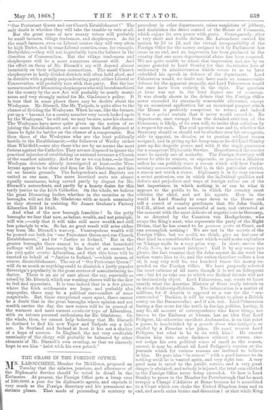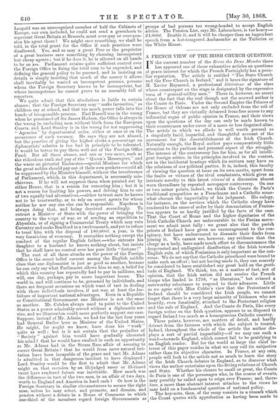THE CRASH IN THE FOREIGN OFFICE.
R. LABOUCHERE, Member for Middlesex, proposed on 1 Tuesday that the salaries, pensions, and allowances of the Diplomatic Service should be voted in detail in the IEstimates. At present, the Foreign Office gets a lump sum of 180,000/. a year for its diplomatic agents, and expends it very much as the Foreign Secretary and his permanent as- sistants please. That mode of proceeding is contrary to precedent in other departments, raises suspicions of jobbery, and diminishes the direct control of the House of Commons, which enjoys its own power with gusto. Consequently, after a very short and feeble debate, Mr. Lalxmchere carried his motion by 76 to 72, and the virtual irresponsibility of the Foreign Office for the money assigned to it by Parliament has come to an end, and an impression has been produced in the country that one more departmental abuse has been removed. We are quite unable to admit that impression, and are by no means grateful to Lord Stanley for that doctrinaire love of uniformity in administration which seems to us to have enfeebled his speech in defence of the department. Lord Palmerston would, we doubt not, have made an unanswerable defence for the apparent anomaly, and Lord Palmerston would for once have been entirely in the right. The question at issue was not in the least degree one of economy. It was clearly shown in the debate that the Foreign Office never exceeded its extremely reasonable allowance, except by an occasional application for an occasional purpose which the House is perfectly competent to refuse, and indeed it was a priori certain that it never would exceed it. No department, once exempt from the detailed criticism of the Commons, is likely, of its own will, to invite that criticism by a request for cash. The real question was and is, whether the Secretary should or should not be absolute over his own agents, able to appoint, to dismiss, or to pension without reason assigned, and in giving up his lump sum as he did Lord Stanley gave up his despotic power, and with it the single guarantee for a competent Diplomatic Service. Henceforn ard the service must be mainly one of seniority. The Foreign Secretary will never be able to remove, or supersede, or pension a Minister unless he can publicly state a reason which will bear Parlia- mentary cross-examination, that is, in this particular service, a reason not worth a straw. Diplomacy is in its very essence a secret profession, one in which the individual qualities and defects and prejudices and ways of foreign rulers are of the last importance, in which nothing is or can be what it appears to the public to be, in which the country must criticize the chief, and not his agents. How in the world is Lord Stanley to come down to the House and. tell a crowd of country gentlemen that Sir John Smith, G.C.B., ablest and most successful of men, and entrusted at the moment with the most delicate of negotiations in Germany, is so detested by the Countess von Hochgeborne, who sways the King's aunt, who represents the party of the Right Divine, that he has ceased to be persona grata at Court, and can accomplish nothing ? We are not in the secrets of the Foreign Office, but we could, we think, give an instance of that kind in a considerable Court which would make capitalists on 'Change smile in a very grim way. In short, sneers the Daily News, he cannot intrigue ? Call it by any name you please, the fact remains that Sir John cannot do the work the nation wants him to do, and the nation therefore suffers a loss of, it may very well be, one hundred times the money ex- pended on the Foreign Office. We have purposely selected the most extreme of all cases, though it is not an infrequent one ; but let us take one to which our Radical friends will not so instinctively object. Lord Palmerston, say, wants to know exactly what the Austrian Minister of State really intends to do about Schleswig-Holstein. The information is a matter of millions, for if Austria is opposed to a war for the " sea- surrounded" Duchies, it will be expedient to plant a British sentry on the Dannewerke ; and if not, not.. Lord Palmerston having a fine scent for the truth in foreign politics, having, it may be, all manner of corresponfients who know things not known to the Embassy at Vienna, has an idea that Lord Pedigree, his otherwise excellent Ambassador, is on this point a goose, is hoodwinked by a grande dame who intrigues, or cajoled by a Prussian who jokes. He must remove Lord Pedigree, but what is he to do with him ? He cannot dismiss him into outer darkness without a reason, can- not assign his own political sense of smell as the reason, cannot, it may be, affront all Lord Pedigree's cousins or the journals which for various reasons are inclined to believe in him. He puts him "in retreat " with a good income to do nothing until he is wanted again, and very right too. A very good man is saved to the public service, and a very great danger is obviated, and nobody is injured, the total sum allotted to the Foreign Office never being exceeded. Or how is Lord Stanley to prove to the Member for Peterborough that he must overpay a Charge d'Affaires at Rome because he is accredited to a Court which can shake the United Kingdom from end to end, and needs extra brains and discretion ? or that while King
Leopold was an unrecognized member of half the Cabinets of Europe, our own included, he could not send a greenhorn to represent Great Britain at Brussels, must over-pay or over-pen- sion his agent there ? We might save something, we shall be told, in the total grant for the Office if such practices were disallowed. Yes, and so may a great Peer or the proprietor of a great business save something by choosing incompetent but cheap agents ; but if he does it, he is allowed on all hands to be an ass. Parliament retains quite sufficient control over the Foreign Office in fixing the total sum to be expended, and defining the general policy to be pursued, and in insisting on details is simply insisting that much of the money it allows shall inevitably be wasted on incompetent persons, persons whom the Foreign Secretary knows to be incompetent, but whose incompetence he cannot prove to an assembly full of reporters.
We quite admit that this absolutism is liable to certain abuses ; that the Foreign Secretary may "make favourites," as children say at school, and that too much power falls into the hands of irresponsible persons. Earl Russell was in the wrong when he pensioned off Sir James Hudson, the Office is always in the wrong in excluding men without birth from the European Courts, and Lord Stanley is in the wrong for not suppressing " Agencies " by departmental order, either at once or on the occurrence of each vacancy. He says they are not abused, but the practice of giving the higher clerks a per-centage on diplomatists' salaries is too bad in principle to be tolerated. It would be better to pay them well out of the Foreign Office Fund. But all these abuses, and one or two more, such as the ridiculous rank and pay of the "Queen's Messengers," and the waste on pictorial Embassies—special Missions for which the great nobles should pay out of their own pockets—could all be suppressed by the Minister himself, without the interference of Parliament, which, in this department, is necessarily mis- chievous. If he will not suppress them when pointed out by either House, that is a reason for censuring him ; but it is not a reason for limiting his powers, and driving him to one of two equally bad alternatives,—either to trust men he knows not to be trustworthy, or to rely on secret agents for whom neither he nor any one else can be responsible. Napoleon is always doing that, and being deceived accordingly. To entrust a Minister of State with the power of bringing the country to the verge of war, or of sending an expedition to Abyssinia, or of signing a Commercial Treaty which may ruin Coventry and make Bradford in a twelvemonth, and yet to refuse to trust him with the disposal of 180,000/. a year, is the very fanaticism of economy. It resembles nothing except the conduct of the regular English father,—who entrusts his daughter to a husband he knows nothing about, but insists that he shall have no control over her poor little "fortune !"
The root of all these attacks on the power of the Foreign Office is the secret belief current among the English middle class that one diplomatist is just as good as another, because he can only say what Parliament allows him to say, a belief for which this country has repeatedly had to pay in millions, and will, one day, perhaps, pay in more important losses. The world is, and will continue to be, governed by individuals, and there are frequent occasions on which want of tact in dealing with those individuals involves, if not war, at least the for- feiture of important national advantages. Even in a Republic or Constitutional Government one Minister is not the same as another. Mr. Cobden always used to point to the United States as a power admirably served without a diplomatic ser- vice, and no illustration could more perfectly support our ease. Suppose, instead of Mr. Adarias, we had for the last four years had General Butler here as Minister of the United States. He might, for aught we know, have done his " work " quite as well ; but is it not certain that the prejudice of " Society " against him would have gradually ulcerated his mind ? that he would have exulted in such an opportunity as Mr. Adams had in the Steam Ram affair of seeming to coerce Great Britain ? that he would from mere natural irri- tation have been incapable of the grace and tact Mr. Adams is admitted in that dangerous incident to have displayed ? Lord Stanley would be the first to admit that Mr. Adams. might on that occasion by an ill-judged sneer or ill-timed taunt have rendered future war inevitable. How much was the difference in tact of the two men, in an affair of two days, worth to England and America in hard cash ? Or how is the Foreign Secretary in similar circumstances to secure the right man, unless he may select, and promote, and dismiss, and pension without a debate in a House of Commons in which one-third of the members regard foreign Governments as groups of bad persons too wrong-headed to accept English advice. The Pension List, says Mr. Labouchere, is too heavy 24,000!. Double it, and it will be cheaper than an imprudent speech from a hot-tempered Ambassador at the Tuileries or the White House.































 Previous page
Previous page